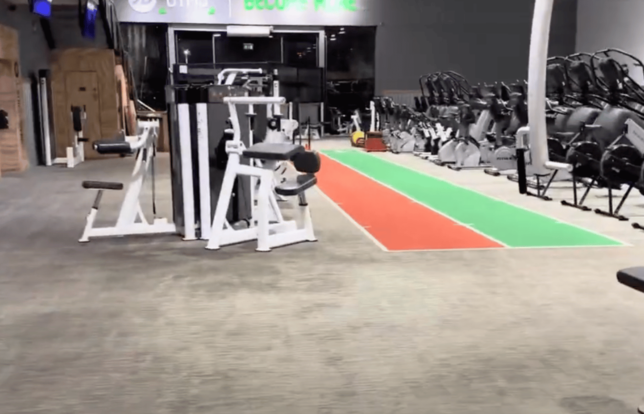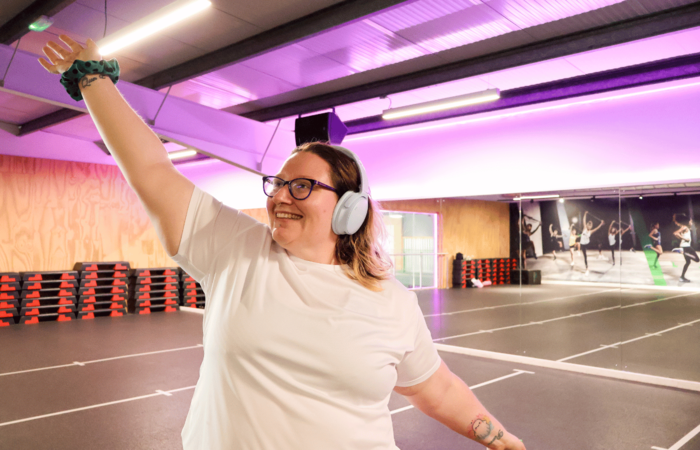Burnout to Balance: Rebuilding My Relationship with Exercise
Originally shared on the Not So Typical Fitness podcast
The Breaking Point: When Discipline Turned Into Burnout
I used to be that person; the one who never missed a gym session.
Every rep tracked. Every calorie counted. Every step logged.
From the outside, it looked like I had fitness figured out: strong, disciplined, consistent.
Looking back, I realise my neurodivergence played a huge role in how I approached fitness—and how I burned out. All-or-nothing thinking, difficulty recognising internal signals, and the constant mental load of "doing everything right" eventually caught up with me.
But underneath? I was running on empty.
Burnout often comes with heightened emotional sensitivity—and for many neurodivergent people, that includes Rejection Sensitive Dysphoria (RSD). When you're already depleted, even neutral feedback can feel crushing. Understanding RSD helped me recognise when my emotional reactions were disproportionate to the situation, which made recovery less confusing.
My mental health was crumbling, my energy was gone, and motivation had completely disappeared. Yet I kept pushing, because I believed stopping meant losing everything I’d worked for.
Eventually, my body made the decision for me.
This is something many neurodivergent people experience; pushing until shutdown, not realising you're heading toward burnout until you're already there. If this sounds familiar, read: Late Autism Diagnosis & Autistic Shutdown to understand how undiagnosed neurodivergence can show up in your fitness journey.
I didn’t choose to rest, I was forced to stop.
And when I did, the guilt hit harder than any workout ever had.
Have you ever reached that point where your body or brain simply said “no more”?
If so, you know exactly what I’m talking about.
Learning to Rest Without Guilt
Here’s what nobody tells you about burnout recovery: Rest doesn’t feel good at first. It feels like failure. It feels like giving up.
But rest isn’t quitting; rest is rebuilding. I had to completely rewire my thinking:
My worth isn’t determined by how productive or fit I am
Skipping workouts isn’t a slippery slope to disaster
Resting doesn’t mean never starting again; it means giving myself space to come back stronger
This mindset shift is especially crucial for neurodivergent people. We're often taught that rest is "lazy" and that we need to work harder to keep up with neurotypical standards. But your brain literally works differently, and ditching the "no pain, no gain" mentality isn't giving up—it's being realistic about what sustainable actually means.
Rest isn't just about recovery days between workouts. Sometimes it means skipping the hotel gym entirely because your body needs a full break. That's not failure—that's listening to what you actually need.
Reframing What Rest Really Means
There were countless days I lay in bed thinking, “Why can’t I just do the thing? Just move? Just try?”
The truth is: when you’ve burned out hard, your body doesn’t trust you yet.
Recovery isn’t just physical; it’s emotional and mental too.
Related post: How to Stay Motivated When You Don’t Have Any Motivation
Also helpful: Some Days I Struggle Too: Mental Health and the Gym - an honest look at what to do when your mental health tanks and fitness feels impossible.
Ask yourself: What would it look like for you to rest 10% more without the guilt?
Start there.
Why Traditional Recovery Advice Didn't Work
After burning out, I tried everything the fitness industry suggested:
"Just take a deload week" (I needed months, not a week)
"Get back on track" (there was no track to get back on)
"Don't break your streak" (the streak was the problem)
None of it acknowledged what I was actually experiencing:
Autistic burnout - Complete depletion from sensory overload and masking
Executive dysfunction - Can't plan, can't decide, can't initiate
Interoception issues - Couldn't tell if I was tired, hungry, or overstimulated
All-or-nothing thinking - If I couldn't do it "right," I wouldn't do it at all
If you're neurodivergent and struggling to recover from burnout, you need strategies designed for your brain. Read: Ultimate Guide to Neurodivergent Fitness for approaches that actually work.
Related: Overcoming Neurodivergent Fitness Hurdles
The Power of Tiny Steps
When I was finally ready to move again, I didn’t leap back into intense workouts.
I started small.
5-minute walks after my morning coffee
Stretching while watching Netflix
Dancing in the kitchen while doing dishes (and counting it as movement)
These tiny actions helped me reconnect with my body; not in a punishing way, but with genuine care and curiosity.
I replaced “I should” with “I could.”
I swapped “do it perfectly” for “just show up.”
Eventually, I made it back to the gym.
Here's what helped me actually return:
Understanding when the gym is quietest so I could avoid sensory overwhelm
Knowing exactly what to do so decision fatigue didn't stop me
Having realistic expectations instead of trying to jump back to where I was
Building routines that worked with my executive dysfunction, not against it
But this time was different; I moved because I wanted to, not because I was trying to control or fix myself.
Movement That Feels Like Care, Not Control
If you’re in the messy middle of burnout; exhausted, overwhelmed, and disconnected from your body, know this:
This isn’t permanent.
You don’t have to hustle your way back.
You can rest your way back.
When you’re ready, your body will meet you there.
Remember, you don't need to do intense workouts to get the mental and physical benefits of being active. Gentle movement counts. Joyful movement counts. Movement on your terms counts.
And when that happens, start with something so small it feels almost silly:
Take a 2-minute walk around the block
Do gentle stretches before bed
Put on music and move however feels good
These aren't "lazy" versions of real workouts, they're exactly what rebuilding looks like.
Your body remembers how to move. It just needs to trust you again. And trust is built through consistency, not intensity.
Read more: 5 Non-Scale Victories That Matter More Than Weight to reframe what success looks like during recovery.
These moments count.
They all count.
What Helped Me Most in Recovery
Looking back, these were the game-changers:
1. Understanding My Neurodivergence
Once I understood I was autistic and had ADHD, everything made sense. I wasn't "lazy" or "unmotivated"—my brain just works differently.
Being a neurodivergent personal trainer now means I can help others avoid the burnout I experienced.
2. Addressing Sensory Needs
The gym doesn't have to be overwhelming. Sensory-friendly fitness strategies made all the difference in making movement sustainable again. And finding spaces that actually understand accessibility—why inclusive gyms matter—meant I wasn't constantly fighting my environment just to show up.
3. Letting Go of Comparison
Everyone online seems to have their fitness "figured out." But behind those highlight reels are struggles you don't see. Focus on your journey, not theirs.
4. Finding Support That Gets It
Working with people who understood burnout, anxiety, and neurodivergence made recovery possible. If you're struggling, overcoming gym anxiety might be your first step.
5. Celebrating Tiny Wins
Small wins build gym confidence more than any perfect week ever could. Every small step matters.
Struggling to make the gym feel less overwhelming?
You’re not alone — and you don’t have to figure it out on your own.
👉 The Sensory-Safe Strength System is an 8-week gym program designed specifically for autistic women. Build real strength without the sensory overload, confusion, or burnout that makes typical programs impossible.
Get instant access for £27 (limited-time offer).
Ready to Rebuild Your Relationship with Exercise?
If this story resonates, you have options for support:
Option 1: Start Learning (Free)
Not ready to commit? Learn first:
Understanding Burnout & Recovery:
Ultimate Guide to Neurodivergent Fitness - Why standard advice doesn't work
Ditching "No Pain, No Gain" - Reframe what healthy looks like
Some Days I Struggle Too - Mental health reality check
How to Stay Motivated Without Motivation - Systems over willpower
Practical Recovery Steps:**
Free Community:
Join the Neurodivergent Fitness Community to connect with others recovering from burnout who understand what you're going through.
Option 2: Get a Gentle Structure (£27)
The Sensory-Safe Strength System - Rebuild strength without recreating burnout patterns.
Perfect for burnout recovery because:
- Zero-decision workouts (reduces cognitive load)
- Flexible pacing options built in
- Sensory accommodations included
- Permission to modify everything
- No "crush it" or "beast mode" pressure
Just £27 (normally £127)
Get the Sensory-Safe Strength System →
Option 3: Supported Return (£349)
Gym Confidence Starter Package - Ease back into fitness with someone who understands burnout.
What this looks like:
We assess where you are NOW (not where you were)
We build a plan around your current energy and capacity
We celebrate tiny wins, not just big milestones
You get 4 weeks of support so you're never alone in recovery
Perfect if you:
Feel overwhelmed by returning alone
Need someone to tell you it's okay to go slow
Want accountability without pressure
Struggle with executive dysfunction
£349 one-off cost
Learn About the Gym Confidence Starter Package →
Option 4: Long-Term Rebuilding Support
RECOMMENDED FOR BURNOUT
Neurodivergent-Friendly Personal Training - Work with me ongoing as you rebuild your relationship with exercise.
Why this works for burnout recovery:
I adjust plans based on your energy that week (not fixed programming)
I understand when you need to rest vs. when you need gentle movement
I celebrate showing up, not just "crushing" workouts
I get how neurodivergence impacts energy, motivation, and recovery
Not sure what working with a PT looks like when you're recovering from burnout? Read: What to Expect in Your First PT Session to see how we'd structure support around your current capacity, not where you think you 'should' be.
Available:
In-person at JD Gyms or Codsall Leisure Centre (Wolverhampton)
Home-based training if leaving the house feels like too much right now
Online coaching with flexible scheduling
Book a free discovery call → to talk about where you are and what support would help most.
Mention this post when you book - I'll know you're in recovery mode and adjust our conversation accordingly.
Not Sure What You Need?
That's okay. Start here:
Send me a message saying "I'm recovering from burnout" and we'll figure out the right first step together. No pressure to buy anything—just a conversation about what would actually help.
The Bottom Line When it Comes to Burnout
Building a sustainable relationship with exercise isn’t about perfect consistency or crushing every workout.
It’s about listening to your body, honouring your energy, and moving from a place of self-care; not self-punishment.
Your worth isn’t measured by your last workout.
Your value doesn’t decrease when you need rest.
And your future fitness isn’t determined by your current capacity.
Show up. Stay you. Go gently.
You’re doing better than you think.
What’s one tiny, joyful movement you could add this week?
Something that feels more like care than control?
Start there.
About My Journey
This post is part of my story, but it's not the whole story.
If you want to understand more about:
Why I became a trainer: My Journey to Becoming a Personal Trainer
How neurodivergence shapes my work: Why My Neurodivergence Shapes My Approach
What makes my approach different: About Rhiannon & Not So Typical Fitness
I built Not So Typical Fitness specifically for people who've felt broken by traditional fitness approaches. You're not broken. The system was.
Keep Reading
If this story resonated with you:
Mental Health & Recovery:
Neurodivergent-Specific:
Practical Recovery Steps:
My Story:





